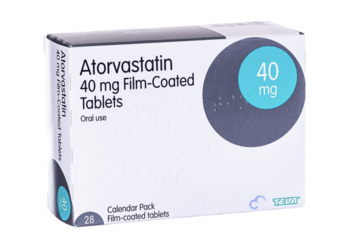Medication features
Atorvastatin Tablets are a prescription-only treatment used to effectively lower cholesterol and triglycerides in the blood for those people who have tried, without success, to lower these levels using diet and lifestyles changes alone
- Helps remove the amount of "bad" cholesterol produced by the liver
- Helps raise good cholesterol
- Only available to those who have been prescribed this by their GP
Overview
What Is Atorvastatin?
Atorvastatin is an effective treatment for high cholesterol. It is also sold under the brand name Lipitor in the UK. The medication is an HMG-CoA reductase inhibitor (statin) which works by slowing cholesterol production in the body. Atorvastatin is available in 10 mg, 20 mg, 30 mg, 40 mg and 80 mg strengths. It contains the active ingredient atorvastatin calcium trihydrate, as well as inactive ingredients including calcium carbonate, hydroxypropyl cellulose, croscarmellose sodium, hypromellose and lactose monohydrate.
What Is Atorvastatin Used For?
Atorvastatin is used to treat high cholesterol and prevent heart disease. You may also be prescribed the medication if you have a family history of heart disease or health conditions such as rheumatoid arthritis or diabetes.
High cholesterol refers to high levels of non-high-density lipoproteins (non-HDLs), sometimes referred to as ‘bad cholesterol’. Non-HDLs can build up in the arteries and result in health problems, including heart attack or stroke.
Combined with regular exercise and a healthy diet, atorvastatin can lower cholesterol in the blood, reducing the risk of heart attack and stroke.
How Does Atorvastatin Work?
Atorvastatin is an HMG-CoA reductase inhibitor (statin) that works by slowing cholesterol production to reduce the amount of cholesterol that could build up on artery walls, potentially blocking blood flow. The medication functions by preventing the liver from producing cholesterol, which in turn reduces your blood cholesterol level.
Atorvastatin and Alcohol
You can drink alcohol while taking atorvastatin, but you should limit your intake. That’s because this medication may cause liver problems, so if you combine it with ethanol (alcohol), it may increase that risk.
There is also the chance that drinking alcohol while taking atorvastatin could increase the chance of, or intensify side effects such as headache, nausea and indigestion.
Atorvastatin and Diabetes
There is some evidence that taking atorvastatin can increase blood sugar levels in some people. High levels of sugars and fats in the blood, as well as being obese and having high blood pressure puts you at a higher risk of developing type 2 diabetes.
You should speak to your doctor if you are concerned about this risk. They can guide you on whether the benefits of taking atorvastatin outweigh the small increased risk of diabetes.
Research has concluded that “the cardiovascular risk reduction benefit from statin far outweighs the potential for adverse effects in all but the very lowest risk individuals,” while another study determined that “the benefits of statin therapy among individuals with diabetes and elevated CVD risk are clearly established”.
If you have type 2 diabetes, your blood sugar levels may be monitored more closely during the first few months of you taking atorvastatin.
Atorvastatin vs Rosuvastatin
Atorvastatin and rosuvastatin are both HMG-CoA reductase inhibitors in the static class of medications, which can be effective in lowering cholesterol. They are both available in tablet form – they both come in 10 mg, 20 mg and 40 mg strengths, and rosuvastatin also comes in 5 mg tablets, while atorvastatin is also available in an 80 mg strength.
The two medications have different metabolism pathways, being metabolised in the liver in different ways. Because of this, rosuvastatin has fewer interactions with other medicines than atorvastatin.
Atorvastatin vs Simvastatin
Atorvastatin and simvastatin (also sold under the brand names Zocor and Simvador in the UK) both belong to the statin class of medications, and work to lower cholesterol levels by slowing cholesterol production. Like atorvastatin, simvastatin comes in 10 mg, 20 mg, 40 mg and 80 mg tablets. The normal adult dosage of the two medications is similar, ranging from 10 mg to 80 mg depending on patient requirements. The two medications also share some potential side effects, such as muscle pain, tiredness and upset stomach.
If you have kidney disease, atorvastatin may be more suitable for you than simvastatin. This is because simvastatin’s highest dosage of 80 mg, once per day, could slow the kidneys. Whether atorvastatin or simvastatin is the most suitable medication will depend on several factors, such as your medical history and other medications you may be taking.
Atorvastatin Reviews
Reviewers have commented online that atorvastatin helped keep their blood cholesterol levels within the normal range. Other users noted that their total cholesterol level dropped in a matter of weeks after beginning to take atorvastatin. Among the potential common side effects cited are muscle spasms, muscle cramps, weight gain and digestion issues.
Can You Buy Atorvastatin Over the Counter?
You can’t buy atorvastatin tablets over the counter in the UK. You must have a prescription to buy this medication, with a medical professional assessing your suitability beforehand. Once you have been issued a prescription, you can purchase atorvastatin tablets online, or from your local high street or supermarket pharmacy.
You can buy atorvastatin tablets quickly and conveniently using Cloud Pharmacy’s online service. After completing a short consultation with one of our online pharmacists, your suitability for the medication can be confirmed, before you are issued a prescription. We can then promptly dispense your atorvastatin tablets and send them via our next-day delivery service.
Directions
Atorvastatin Interactions
Certain other medicines may interact with atorvastatin and increase the risk of muscle problems. Before starting to take atorvastatin, you should tell your doctor if you are currently taking, or have taken:
- Other medications for high cholesterol
- Antibiotics
- Antifungal medicines
- Contraceptive pills
- Heart medication
- Medicine for preventing organ transplantation rejection
- Medicine to treat HIV
- Medicine to treat hepatitis C
You shouldn’t drink grapefruit juice or eat grapefruit while you are taking atorvastatin. That’s because the compounds in the fruit may interact negatively with statins such as atorvastatin, and increase blood levels of the medication.
Atorvastatin Dosage
The usual atorvastatin adult dosage is between 10 mg and 80 mg, once per day. Your dosage will depend on a number of factors, including why you are taking atorvastatin, your cholesterol levels, and other medicines you may be taking. You shouldn’t reduce your atorvastatin dosage without speaking to your doctor.
How Long Does Atorvastatin Take To Work?
Your cholesterol levels should have decreased within four weeks of starting to take atorvastatin if you keep to your prescribed dosage. As the medication takes effect, you might not feel any different, as the majority of people who have high cholesterol don’t have symptoms.
How long you will have to take atorvastatin will depend on your reason for taking the treatment. Some people will need to take it for months, years or even for life. If you experience uncomfortable side effects from atorvastatin, your doctor may change your dosage or recommend alternative medicine.
You shouldn’t stop taking atorvastatin unless directed to do so by your doctor. If you stop taking atorvastatin for the recommended amount of time, your cholesterol level could rise, increasing your risk of health problems.
How to Take Atorvastatin
You will take atorvastatin tablets once per day, at a time of your choice. Atorvastatin tablets can be taken with or without food. They should be swallowed whole with water. You shouldn’t break or crush atorvastatin tablets, and you shouldn’t chew them unless you’ve been given chewable tablets.
Side Effects
Atorvastatin Side Effects
Not everyone taking atorvastatin will experience side effects. If you do have some side effects from atorvastatin, they may subside after the first few days. Among the most common potential side effects of atorvastatin, which occur in more than 1 in 100 people, are:
- Headache
- Nausea
- Indigestion
- Nosebleeds
- Cold-like symptoms
- Flatulence
- Diarrhoea
- Constipation
Serious side effects from atorvastatin are rare. If you suffer from any of the following side effects, stop taking the medication and contact a medical professional or call 999:
- You have signs of liver problems, such as the whites of your eyes or skin turning yellow, or you have pale stools and dark pee
- Unexplained muscle pain or cramps
- Severe stomach pain
- Pink or red skin rash, particularly on the palms of hands or soles of feet
- Symptoms of an allergic reaction such as sudden skin rash, wheezing, breathing difficulty, tightness in the throat, tightness in the chest, difficulty talking, and swelling around the face or inside the mouth
Patient Information Leaflet
Atorvastatin Tablets Patient Information Leaflet
For more information on Atorvastatin tablets, take a look at the Patient Information Leaflet below:
Atorvastatin Tablets Reviews
Confirm Atorvastatin Tablets treatment selection
| 10mg | 84 | £18.99 |
| 20mg | 84 | £18.99 |
| 40mg | 84 | £18.99 |
















